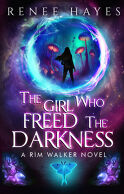Again, Hayes deftly blends the magical and the post-apocalyptic as Zee traverses a fallen Earth 500 years in our future, a world where fairies themselves, here called “orcles,” labor to usher in new life. Zee’s quest will take her to wonderous caves, to encounters with inventive creatures—like the moss-covered Armilandro with “a whole ecosystem upon its back” —and even into face-to-face meetings with forces beyond our understanding. Meanwhile, something blooms in lovely scenes between Zee and Ravaryn, who finds her scars beautiful.
Zee’s quest both illuminates how everything has changed in the aftermath of her heroism in the first book, while also plunging deeper into her world’s most unexpected elements, as Hayes springs on her compelling challenges touched with the fae and the mythic. The rest of the cast, though, is engaged in catch-up missions, trying to track down Zee, though those stories all eventually twist. This polished, often gripping fantasy builds to a tantalizing promise of conflicts to come.
Takeaway: Smart, intimate post-apocalyptic fantasy where heroism comes at the cost of a curse.
Comparable Titles: L D Houghton’s Mindfire, Aiden Thomas’s Lost in the Never Woods.
Production grades
Cover: A-
Design and typography: A
Illustrations: N/A
Editing: A
Marketing copy: A
Reminiscent of classic coming-of-age fantasy adventure fare but still freshened up for the era of apps, Magic, Mystery and the Multiverse offers genre-bending for all of its juxtapositioned settings—from medieval-like realms to highly advanced technologically driven worlds—human struggle, and a touch of dystopia and politics. Winter incorporates a world where oxygen is commercialized, and those in positions of power can cast a spell for forced obedience, creating societies where “It’s not safe to think a contrarian thought.” These facets serve as a socio-political commentary challenging a reflection of contemporary and perennial issues, drawing parallels to capitalism, the suppression of speech, and global protests against authoritarian regimes. Amid these, the core of the story remains tethered in a human struggle—Zack's cancer diagnosis.
Although fast-paced, the world-building is meticulous and exciting in the sense that as the story appears to be drawing near its conclusion, the intricate motivations of various characters come to the forefront, driving the narrative's momentum. Opus Die has yet to show himself, the Crimson Censor is still alive, Lord Orator comes with a bargain, and the rest of the ensemble believes Ana may be the key to fulfilling the prophecy. These intricate plot threads keep readers eagerly anticipating the forthcoming installment.
Takeaway: Inventive series starter that joy rides through an unpredictable multiverse.
Comparable Titles: Alix E. Harrow's The Ten Thousand Doors of January, Claudia Gray's A Thousand Pieces of You.
Production grades
Cover: A-
Design and typography: A
Illustrations: A
Editing: A
Marketing copy: A-
Inspired by a narrow-minded boss in real life who branded McCoy a “bland loafer”—defined as “that rare individual that ‘privilege’ has left in material, philosophical and spiritual shamble”—the novel poses incisive questions about power and culture in America, especially what it means to refuse, in McCoys words, to allow himself to be defined “as someone who others can simply extract labor from.” That’s from Mccoy’s introduction, which illuminates a novel where style submerges plot while offering powerhouse jeremiads against societal injustice and backwardness, against conventional wisdom and racial and class injustice, plus bursts of poetry, Ford’s surging inner thoughts, and debates with frustrated family members.
With subtle humor, principled outrage, polemical power, and an occasional zeal to “turn the anxiety of meaninglessness into courage,” the protagonists and his acquaintances enjoy contemplating the works of history’s greatest minds—Wittgenstein, Kant, and Niebuhr. The result is a highly intelligent, challenging, insightful exploration of history’s missteps and repercussions, and of a world seemingly set up to “crush the spirit of the Bland Loafer.” Readers of searching, discursive literary fiction will cheer as Ford stubbornly trudges after his intellectual dreams against the harsh tide of society.
Takeaway: Searing novel documenting the mind, debates, and outrage of a “bland loafer.”
Comparable Titles: Paul Beatty, Ralph Ellison.
Production grades
Cover: A
Design and typography: A
Illustrations: N/A
Editing: A-
Marketing copy: A
What ensues, over this epic-length travel tale, is a series of comic misadventures across Southeast Asia, as Parker, born a Christian, faces growing Hindu nationalism in India and a host of surprises abroad, in Malaysia and Thailand, with sharply drawn women he meets on Tinder, a CouchSurfing app, and elsewhere. He works with a woman to establish safe places for cows and street dogs; falls under the spell of social-media religious leaders who make pitches like “Pay only $4,999 US dollars, and liberate your soul”; seeks spiritual breakthroughs in the wrong kind of Bangkok spa; visits a hunter-gatherer tribe in the Malaysian highlands, where he’s mistaken for child-thieving police.
Franco’s prose and perspective are continually arresting, and the novel bursts with amusing incident and food for thought, especially on the subjects of commodified enlightenment, the exploitation of women and the global poor, and the (hilarious, troubling) flexibility of its narrator’s ideas. But the novel’s length, its anecdotal naif’s-progress structure, and general low stakes mean that it often feels long, lacking a compelling narrative drive. Still, as Parker ducks bees, endures misunderstandings, and encounters (but doesn’t quite suss out) the hypocrisies of rulers and faith leaders, Franco stirs serious, often pained laughs.
Takeaway: Truly funny novel of a South Indian man's journey toward enlightenment.
Comparable Titles: Shashi Tharoor, Anurag Mathur.
Production grades
Cover: A
Design and typography: A
Illustrations: N/A
Editing: A-
Marketing copy: A-






